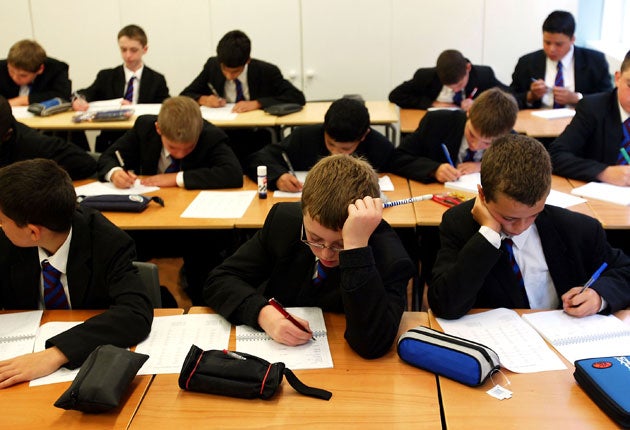Children suffer in classrooms with poor acoustics
A study has shown that high noise levels have an impact on memory, reading and numeracy skills

Children who study in noisy classrooms with poor acoustics suffer academically, a new study claims. Experts say that while classroom chatter is unavoidable, many students and teachers suffer needless levels of noise because of badly designed classrooms that exacerbate the problem, or poorly insulated rooms that fail to block outside noises such as aircraft and traffic.
They warn that government proposals to relax noise control rules when picking new school sites could harm pupils.
A study by researchers from the Institute of Education and the Institute of Acoustics took two age groups of secondary-school students and exposed them to low and high levels of noise while being taught. Tests on their working memory, reading and numeracy skills showed that, in noisy conditions, 14- to 16-year-olds performed at levels no better than 11- to 13-year-olds did in the quiet.
Previous studies have shown primary-school-age children perform worse in poor acoustic conditions, but this is the first evidence that it also affects older children.
In the tests, half of each class listened to 50 decibels of background noise through headphones as they worked, while the other half were exposed to levels of 70 decibels. As a control, after one week they swapped over.
Dr Daniel Connolly, of the Institute of Education, said the study showed that poor acoustics were very bad for learning. "In a lot of tasks, higher noise levels take the older age group back to the same level as the younger age group. There will always be a certain amount of noise in a school, but if you put students in an acoustically poor room it will amplify that."
In a government-wide drive to reduce unnecessary red tape, Education Department officials are reconsidering a requirement that stipulates schools must be "suitable" acoustically.
Kathryn Harper-Quinn, head teacher of Hounslow Heath Infant School, which is in the flight path of Heathrow airport, has direct experience of the importance of protecting a school from a noisy environment.
"It is something the Government needs to worry about because, if they don't take acoustics into account, then they will be facing a big problem. We have planes going over about every minute. It has taken us many years to get the building sorted so they aren't a distraction but there's still a long way to go.
"Since we insulated the building we've noticed a big improvement in concentration, but ideally schools would be built in a place where noise isn't an issue."
Tomorrow sees the start of Noise Action Week, aimed at highlighting the damaging impact a loud environment can have.
Mary Stevens, of Environmental Protection UK, which sponsors the initiative, said: "There's a big drive for deregulation at the moment, but if we lose acoustic planning requirements for schools then we'll lose valuable protection from noise, which would have a serious impact on teachers and pupils."
Join our commenting forum
Join thought-provoking conversations, follow other Independent readers and see their replies
Comments
Bookmark popover
Removed from bookmarks